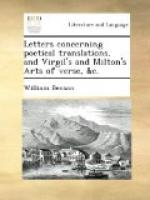It is no wonder that Verse without Rhyme has so many Advocates amongst the Dealers in Poetry, because of its Facility. Rhym’d Verse, with all its Ornaments, especially the artful Way of varying the Pause, is exceeding difficult; and so are all the curious Productions of Art. Fine Painting, fine Musick or Sculpture, are all very hard to perform; it is the Difficulty that makes those Performances so deserving of Applause when they attain the highest Perfection. As to the Matter before us; Rhyme (as Mr. Dryden justly observes) never was Milton’s Talent: This appears from his juvenile Poems. And when he sate down to write the Paradise lost, his Imagination was too vigorous, too lofty to be shackled by Rhyme. It must be own’d that a thousand Beauties would have been lost, which now shine with amazing Splendor in that Poem, if Milton had writ in the most exquisite Rhyme. But then on the other hand, it is as certain that upon the whole it would have been a more agreeable Poem to the Generality of Readers than it is at present. Of this Opinion was the learned Foreigner mentioned in a former Letter, a judicious Critick both in the ancient and modern Languages.
“Quicquid tamen ejus sit, ostendunt Miltoni scripta virum vel in
ipsa juventute: quae enim ille adolescens scripsit carmina Latina,
una cum Anglicis edita, aetatem illam longe superant, qua ille vir
scripsit poemata Anglica, sed sine rythmis, quos, ut pestes carminum
vernaculorum, abesse volebat, quale illud decem libris constans,
The Paradise Lost, plena ingenii & acuminis sunt, sed insuavia
tamen videntur ob rythmi defectum; quem ego abesse a tali carminum
genere non posse existimo, quicquid etiam illi, & Italis nonnullis,
& nuper Isaaco Vossio in libro de Poematum cantu, videatur.”
Polyhist.
However, we must take Paradise Lost as it is, and rejoice that we have in it, one of the finest Works that ever the Wit of Man produc’d: But then the Imperfection of this Work must not be pleaded in favour of such other Works as have hardly any thing worthy of Observation in them. Placing Milton with his blank Verse by himself (as indeed he ought to be in many other respects, for he certainly has no Companion) this Dispute about the Excellency of blank Verse, and even the Preference of it to rhym’d Verse, may be determined by comparing two Writers of Note, who have undertaken the same Subject; that is, Virgil’s AEneid.
Now I will take all the Passages of that Poem mentioned in my Letters to you, and compare them in these two Translations: And if it shall appear by the Comparison that the rhym’d Verses have not only more Harmony and Conciseness, but likewise that they express Virgil’s Sense more fully and more perspicuously than the blank Verse, will it not be easy to determine which of these two Sorts ought to be preferr’d?




